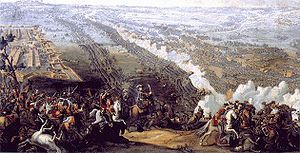- Charles XII invasion of Russia
-
The Invasion of Russia by Charles XII Part of Great Northern War 
The Battle of Poltava by Denis Martens the Younger, painted 1726Date 1708—1709 Location Russia Result Russian victory Belligerents  Swedish Empire
Swedish Empire Russian Empire
Russian EmpireCommanders and leaders Charles XII Peter the Great The invasion of Russia by Charles XII of Sweden was a campaign undertaken during the Great Northern War between Sweden and the allied states of Russia, Poland, and Denmark. The invasion began with Charles's crossing of the Vistula on 1 January 1708, and effectively ended with the Swedish defeat in the Battle of Poltava on 8 July 1709, though Charles continued to pose a military threat to Russia for several years while under the protection of the Ottoman Turks.
In the years preceding the invasion of Russia, Charles had inflicted significant defeats on the Danish and Polish forces, and enthroned the puppet king Stanislas Leszczyński in Poland. Having consolidated his victories there, Charles turned his attentions to Russia. He entered Russia by crossing the frozen Vistula River at the head of 40,000 men, approximately half of them cavalry. This tactic was characteristic of his military style, which relied on moving armies with great speed over unexpected terrain. As a consequence of this rapid initiation of the campaign, Charles nearly gave battle with Peter just one month into the campaign, reaching Hrodna, now in Belarus, a mere two hours after Russian forces had abandoned it.
Charles was a skilled military leader, and probably considered the invasion to be a risky enterprise; he had resisted the advice of his generals to invade during the Russian winter following the first Battle of Narva (1700). He chose to continue his invasion now because he expected Swedish reinforcements and the alliance of the Cossacks under Ivan Mazepa. The reinforcing Swedish army, however, was ambushed by Russians, and a Russian army under Aleksandr Danilovich Menshikov had destroyed Mazepa's capital and chased him to Charles with just thirteen hundred men.
The invasion was further complicated by the scorched earth strategy formulated by Peter and his generals. The Russian armies retreated continuously, dispersing the cattle and hiding the grain in the peasant towns they passed, burning unharvested crops, and leaving no resources for the Swedish army to stave off the Russian winter. By the end of the winter of 1708-1709, the "Great Frost of 1709" had devastated the Swedish army and shrunk it to 24,000 men. In May of 1709, the Swedish forces caught up to the Russians, and the two armies clashed in the Battle of Poltava. The Swedish were defeated, and the greater part of Charles's army, some 19,000 men, were forced to surrender.
Charles fled to the protection of the Ottoman Turks to the south, who were traditionally hostile to Russia. Here, Charles was eventually able to persuade the Sultan Ahmed III to declare war on Russia. Backed by a Turkish army of 200,000 men, Charles led the Turks into the Russo-Turkish War (1710–1711). Before Charles could give battle, though, Peter was able to bribe the Turkish vizier to peace; with this, Charles's ambitions to invade Russia were ended.
The consequences of the failed invasion were far-reaching. The Swedish Empire never added new territory after the Battle of Poltava. George I of Great Britain led Great Britain and Prussia into war against Sweden, and Denmark reentered the war. Russia gained prestige in Europe, and won Louis XIV as an ally.
Categories:
Wikimedia Foundation. 2010.
